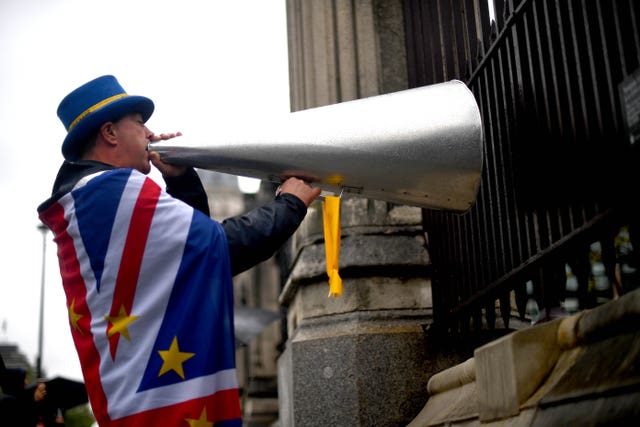Police in Westminster have seized amplifiers from “Stop Brexit Man” Steve Bray after they said he was protesting too loudly.
On Tuesday afternoon, a group of officers swooped on Mr Bray, who appeared to try and stop them taking his amplification equipment.
Mr Bray was told that under the Police Crime Sentencing and Courts Act, which came into force earlier in the day, he was forbidden from holding a noisy protest within a designated area outside the Houses of Parliament.
The top hat-wearing demonstrator is often seen in the area playing loud music in a protest sometimes coinciding with Prime Minister’s Questions.

Mr Bray was known as the Stop Brexit Man because he used a megaphone to shout “Stop Brexit”.
In social media footage, Mr Bray, who was surrounded by banners and European Union flags, could be seen struggling with officers and telling them “hands off” as they attempted to take the amplifiers.
An officer could be heard responding: “You’ve already been warned not to turn it on.”
Mr Bray then demanded officers return a banner he said had been taken from him, before accusing them of breaking one of the amplifiers.
His hat could be seen falling off in the scuffle.
An increasingly irate Mr Bray could be later heard shouting at officers: “You fascists! This is not law! Fascist mouthpiece.”
In another video on his Twitter account, a police officer was heard telling Mr Bray he will be summoned to court over getting his amplifiers back.
Other officers could be heard warning Mr Bray he could be arrested if he continues using the speakers to play music in the area.
The laws came as part of the Police, Crime, Sentencing and Courts Act, which included measures to curtail noisy protests.
Officers said the equipment was being seized under section 145 of The Police Reform and Social Responsibility Act 2011, which on Tuesday was extended to a wider area around the Houses of Parliament.
The Metropolitan Police has been approached for comment.
Grahame Morris, Labour MP for Easington, condemned the action to “silence” Mr Bray.
He told the House of Commons: “I know many of us have had brushes with Mr Bray but his voice is being silenced today – by tomorrow there could be many others who have never demonstrated previously who are subject to prosecution under this law.”




Why are you making commenting on The National only available to subscribers?
We know there are thousands of National readers who want to debate, argue and go back and forth in the comments section of our stories. We’ve got the most informed readers in Scotland, asking each other the big questions about the future of our country.
Unfortunately, though, these important debates are being spoiled by a vocal minority of trolls who aren’t really interested in the issues, try to derail the conversations, register under fake names, and post vile abuse.
So that’s why we’ve decided to make the ability to comment only available to our paying subscribers. That way, all the trolls who post abuse on our website will have to pay if they want to join the debate – and risk a permanent ban from the account that they subscribe with.
The conversation will go back to what it should be about – people who care passionately about the issues, but disagree constructively on what we should do about them. Let’s get that debate started!
Callum Baird, Editor of The National
Comments: Our rules
We want our comments to be a lively and valuable part of our community - a place where readers can debate and engage with the most important local issues. The ability to comment on our stories is a privilege, not a right, however, and that privilege may be withdrawn if it is abused or misused.
Please report any comments that break our rules.
Read the rules hereComments are closed on this article